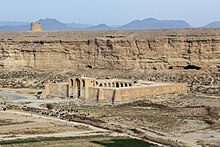Our website is made possible by displaying online advertisements to our visitors.
Please consider supporting us by disabling your ad blocker.
Caravanserai

A caravanserai (or caravansary; /kærəˈvænsəˌraɪ/)[1] was a roadside inn where travelers (caravaners) could rest and recover from the day's journey.[2] Caravanserais supported the flow of commerce, information, and people across the network of trade routes covering Asia, North Africa and Southeast Europe, most notably the Silk Road.[3][4] Often located along rural roads in the countryside, urban versions of caravanserais were also historically common in cities throughout the Islamic world, and were often called other names such as khan, wikala, or funduq.[5]
- ^ "Dictionary.com – caravansary". Archived from the original on 12 December 2019. Retrieved 31 January 2016.)
- ^ Chisholm, Hugh, ed. (1911). . Encyclopædia Britannica (11th ed.). Cambridge University Press.
- ^ "Caravanserais: cross-roads of commerce and culture along the Silk Roads | Silk Roads Programme". en.unesco.org. Archived from the original on 29 May 2020. Retrieved 17 June 2020.
- ^ "Caravanserai". National Geographic Society. 23 July 2019. Archived from the original on 29 July 2020. Retrieved 17 June 2020.
- ^ M. Bloom, Jonathan; S. Blair, Sheila, eds. (2009). "Caravanserai". The Grove Encyclopedia of Islamic Art and Architecture. Oxford University Press. ISBN 978-0-19-530991-1.
Previous Page Next Page


